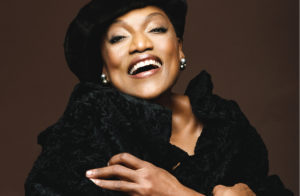
Artist Profile: Jessye Norman, One of Opera’s Greatest Sopranos
By Gillian Reinhard(Credit: Carol Friedman)
July 14 is Bastille Day, a celebration to commemorate the French Revolution. In 1989, France invited one of the world’s greatest sopranos, Jessye Norman, to sing the national anthem in commemoration of the 200th anniversary of the Storming of the Bastille in 1789.
Norman, who began her career in Europe, maintained a close association with France. That same year, she was awarded the prestigious Légion d’honneur, just one testament to her extraordinary life as an artist.
Norman was born September 15th, 1945 in Augusta, Georgia. Inspired by Marian Anderson and Leontyne Price from an early age, she decided to pursue a career in music. Norman began her studies at Howard University and later at the Peabody Institute and University of Michigan School of Music. Though was lauded as one of America’s greatest opera singers, Norman began her career in Europe, particularly Europe, where she made a name singing Wagner in Germany. Not long after, she sang “Aida” at La Scala and “Les Troyens” at the Royal Opera House.
She briefly returned to the United States—making appearances at Tanglewood (Massachusetts), Lincoln Center (New York), and the Hollywood Bowl (Los Angeles)—but returned to London to reinvent her career singing works such as Mendelssohn’s “Elijah.” After a successful few years as a concert performer, Norman returned to opera.
She made her debut at the Metropolitan Opera in 1983 and premiered new works by Judith Weir to great acclaim. By this time, Norman had achieved “household name” status, performing for US President Regan as well as Queen Elizabeth II. Around this time, as well, Norman sang “La Marseillaise” for the 200th anniversary of the French Revolution from Paris’ Place de la Concorde.
Other important concerts included the 150th birthday celebration of Tchaikovsky (in the then-Soviet Union), the funeral of Jackie Kennedy Onassis, as well as a special concert in Carnegie Hall opposite Kathleen Battle.
Norman was recruited to sing at nearly all major events—from American presidential inaugurations to Olympic Games ceremonies. Later in life, she retired from the operatic stage and embarked on an extremely successful career in a series of recitals. She also committed to extensive community service to the city of New York as well as HIV/AIDS awareness. She passed away at age 74 in 2019, leaving an incredible legacy.
Signature Roles
Jessye Norman possessed one of the most unique and versatile voices in opera, and it would be difficult to describe her range in just a few signature roles. Her French repertory included Berlioz’s “Les Troyens,” Offenbach’s “Tales of Hoffman,” and even Bizet’s “Carmen.” Norman also championed several Wagner roles—including “Tannhauser,” “Die Walkure,” “Parsifal,” and “Lohengrin.”
She also promoted lesser known works, including operas by Haydn, Bartók, and several by Poulenc. Other major interpretations include the title roles in Verdi’s “Aida” and Strauss’ “Salome” as well as Leonore in Beethoven’s “Fidelio.” Norman is also remembered for her extensive recital and oratorio performances by Berlioz, Brahms, Mahler, and many others.
Watch & Listen
“Spirituals in Concert,” Jessye Norman and Kathleen Battle, Carnegie Hall, 1980
“Morgen,” by Strauss, 1991
“Dialogues des Carmélites,” Metropolitan Opera, 1987
“Die Walkure,” Metropolitan Opera
Categories
Opera Wiki

